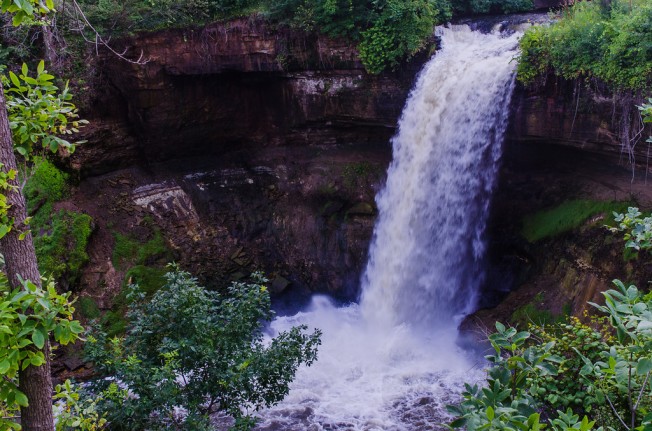
THE FALLS OF MINNEHAHA.
ABOUT nine miles above St. Paul, Minnesota, and about half a mile from the Mississippi River on the west side, are the beautiful and widely renowned Falls of "Minnehaha," in a small river bearing the same name. The accompanying picture gives but a poor idea of this beautiful waterfall.
A semi-circular limestone cliff forms the brink of the falls, and partly encircles a chasm, or basin, into which the water plunges and flows away in a narrow, rapid stream. At the brink, the sheet of water is said to be about eighty feet in width, and it is about sixty feet in perpendicular descent, and is so thin, and in such a constant quiver, as to suggest the idea of the shaking out of the folds of white lace, and fully justifies the beautiful appellation, Minnehaha (Laughing Water.) A flight of sixty-one steps leads down to the bottom of the chasm, where a small bridge crosses the river a few rods below the falls. The sand-rock underlaying the limestone cliff has been so worn away that one who has sufficient nerve to do it may pass completely round behind the falls.
The pleasing and yet sad traditions associated with the place, and the picturesque scenery surrounding it, rendered it a sacred and favorite camping-ground of the Indian in the past, and now make it a popular place of resort for the race that has supplanted him in its possession. Long-fellow, in his poem entitled "Hiawatha," relates an Indian tradition in which a young Ojibwa brave is represented as having won as his bride a beautiful Dakota maiden, whose father, an arrow-maker, lived near the falls whose name she bore:—
"Homeward now went Hiawatha;
Pleasant was the landscape round him,
Pleasant was the air above him.
* * * x * * *
Only once his pace he slackened,
Only once he paused or halted,
Paused to purchase heads of arrows
Of the ancient arrow-maker,
In the land of the Dacotahs,
Where the falls of Minnehaha
Flash and gleam among the oak-trees,
Laugh and leap into the valley.
"There the ancient arrow-maker
Made his arrow-heads of sandstone,
Arrow-heads of chalcedony,
Arrow-heads of flint and jasper,
Smoothed and sharpened at the edges,
Hard and polished, keen and costly.
"With him dwelt his dark-eyed daughter,
Wayward as the Minnehaha,
With her moods of shade and sunshine,
Eyes that smiled and frowned alternate,
Feet as rapid as the river,
Tresses flowing like the water,
And as musical a laughter;
And he named her from the river,
From the waterfall he named her,
Minnehaha, Laughing Water."
But those, who figured in the traditions circling round the sacred name have long since gone to the "happy hunting grounds," and other feet tread within the precincts of the hallowed place. From this scene of beauty, we revert, in thought, to that happy land of which the poor Indian has such rude conceptions, where no shadow shall dim, and no sorrow circle around the lovely places of the earth.
Reader, will you be there?
A. SMITH.

THE LITTLE RILLS.
ONCE upon a time a man was traveling along over the Alleghany mountains, when he met a number of little rills skipping along, and he asked them where they were going.
"Oho," they said, "just down the mountain."
"And what are you going to do as you go down the mountain!" "Oh, we shall make friends with other little rills, and grow bigger."
"And what will you do when you grow bigger?"
"Oh! We shall turn saw-mills and grist-mills;
and when we get down through all the rocks on the plains, we shall set some great iron factories and cotton-mills in motion."
"And what will you do then'?" "Then, why,
we shall make the Alleghany and Monongahela rivers; and when we are big enough, we shall make the great Ohio."
"And what will you do when you get to be the great Ohio?" "Oh! Then we shall take on our backs great rafts and steamboats, and help build up, all along, . beautiful towns, and villages, and cities."
"And what then?" "What then? Why, we shall unite our forces with the Missouri and Mississippi, and help them carry a thousand great boats to the ocean."
"What! You going to do all this, you little rills?"
"Yes, sir, we are; but if you don't believe us, we can't stop to convince you of it, for we are in a hurry." And off they ran on a jump.
If the little rills are going to do so much, what will the children, who are growing larger and stronger every day, do by-and-by in the world?
Some who are bright and sparkling now, will, I am afraid, run into the first snug and sunny spot, and there stay until they dry up. An easy, selfish life, blessing nobody, at last shrinks to nothing.
Others who are promising now, will by-and-by be diverted from the right way, and turn off into dark channels, where they will be lost; and others, a great number of our dear boys and girls, I pray God, may grow up, strong and good, to unite their forces with others, and bless the places where they live, and make- the world better for their having lived in it.
"Little drops of water,
Little grains of sand,
Make the mighty ocean
And the beauteous land."
So, too, little deeds and words of love may do great and glorious things, making this earth of ours something like heaven.
Selected.
.jpg?timestamp=1395536243961)